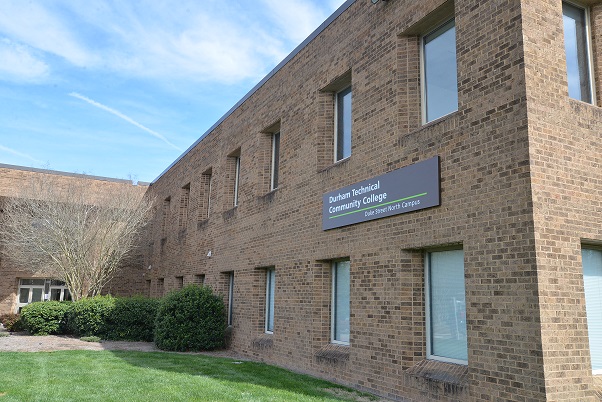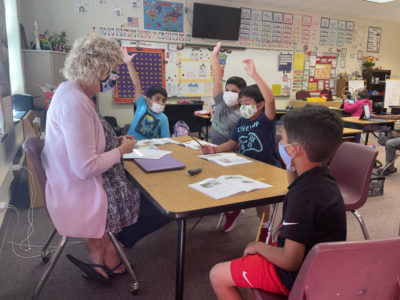

|
|
It’s the fall of 2019, a month before the State Board of Education convenes a task force to guide the state’s approach to reading instruction. It’s more than a year before the bill is filed that mandates instruction be grounded in the science of reading.
In a small room down the hall from the Dallas Herring Conference Room at the Community College System building, then-president Peter Hans is talking to a dozen system leaders about a project — a hope to add qualified teachers to the state’s teacher pipeline by offering an associate’s degree in teacher preparation.
“Every one of our students should understand the science of reading,” he tells the group.
Fast forward to the start of college classes this week, and Hans’ vision is becoming real. Under the leadership of President Thomas Stith and the associate vice president for academic programs, Lisa Mabe Eads, 52 of North Carolina’s 58 community colleges will offer two degrees for future teachers — an associate in arts and an associate in science in teacher preparation.
As designed from the beginning, the science of reading will be in the course catalogue. One of the four required education courses for the associate’s degree is Literacy Development and Instruction, EDU 279, a four-credit-hour study in the scientific research about how kids learn to read.
“It has been fully developed by colleagues across the state who do have the knowledge and the expertise in the brain development and all of the great research around the science of reading,” said Cathy Collie-Robinson, director of the early childhood education program at Durham Tech. “In fact, the course is built around that. The very first module that they put out there was the science behind reading, and so I’m really excited for that.”
It’s all ‘going to be aligned’
EDU 279 will be one of at least three courses in literacy that future teachers need to take, with at least two courses required after these students transfer to a campus in the UNC System or North Carolina Independent Colleges and Universities (NCICU). The community college system has signed articulation agreements with both to ensure students’ credits transfer to UNC System and NCICU schools.
Durham Tech President JB Buxton is another who says future teachers need to know about the vast research on how kids’ brains learn to read. In 2019, when he was a member of the State Board of Education, he worked with Senate President Pro Tem Phil Berger to draft a bill similar to the one enacted this April.
Buxton said the community college system has worked with the Department of Public Instruction, where most community college students who want to become teachers ultimately will work, and the UNC System and NCICU, where they will complete their teacher training, to develop coursework that ensures that what students are taught at Durham Tech is consistent with their future training and experience.
“It’s not 52 or however many [community colleges] doing their version of the science of reading or their version of what they think strong literacy instruction is,” he said. “It’s our state’s approach to literacy instruction, which then necessarily is going to be aligned with where the Department of Public Instruction, the State Board, and our UNC System is.”
The course should look mostly the same at any community college in the state, because a central team of community college faculty is developing it, Collie-Robinson said. Durham Tech, for example, won’t offer the course for the first time until spring 2023 (in the last semester for teacher candidates who are entering the associate’s program in teacher preparation now). But the school already has a head start on what the course should look like.
“I can say that our systems office has been wonderful throughout this whole process, as have my colleagues across the state,” Collie-Robinson said. “It is tricky to find the time to develop a brand new course. So we have been in constant communication with our education colleagues across the state about who’s teaching this course, when are you teaching these courses, how are you teaching these courses.”
The community colleges require the literacy course for every aspiring teacher, not just those who know they want to teach in elementary schools. Another course required for the teacher preparation degree is called Teaching and Learning for All. This is what Collie-Robinson calls the “Do you really want to be a teacher?” course.
As part of it, students will spend time at one of the three area school districts’ elementary, middle or high schools to observe and help in the classroom. It’s designed to give college students a taste of what teaching is like.
Buxton said the college is in discussions with district partners in its service area, as well as North Carolina Central University, to build pathways for its students to complete teacher training in Durham and then teach in an area public school. Durham Tech’s service area includes Durham Public Schools, Orange County Schools, and Chapel Hill-Carrboro City Schools.
Affordability and diversity are crucial
David Long, dean of the Creative and Liberal Arts Department at Durham Tech, said enrollment at teacher preparation programs in the state is down about 40% over the past decade. Durham Tech, he said, can help increase North Carolina’s supply of teachers by offering students a local, affordable option to start the training process.
Another need driving the degree programs was to address the racial and gender composition of the teacher pipeline. Long said about 80% of teachers in North Carolina are white. In Durham Public Schools, more than 70% of the students are Black or Brown. He said he hopes Durham Tech can help provide students with more teachers who look like they do.
Finding local talent from populations that aren’t well represented in the current teacher workforce was the driving force for offering these degrees, according to the system office.
“Community colleges have the best chance of helping rural counties ‘grow their own’ teachers,” Eads said. “Community colleges are more accessible to students in rural areas of the state. Additionally, the low cost of community college tuition helps to remove or reduce the financial barrier of attending college.
“Our goal is to recruit teachers from underrepresented populations and those who are more likely to settle near home.”



